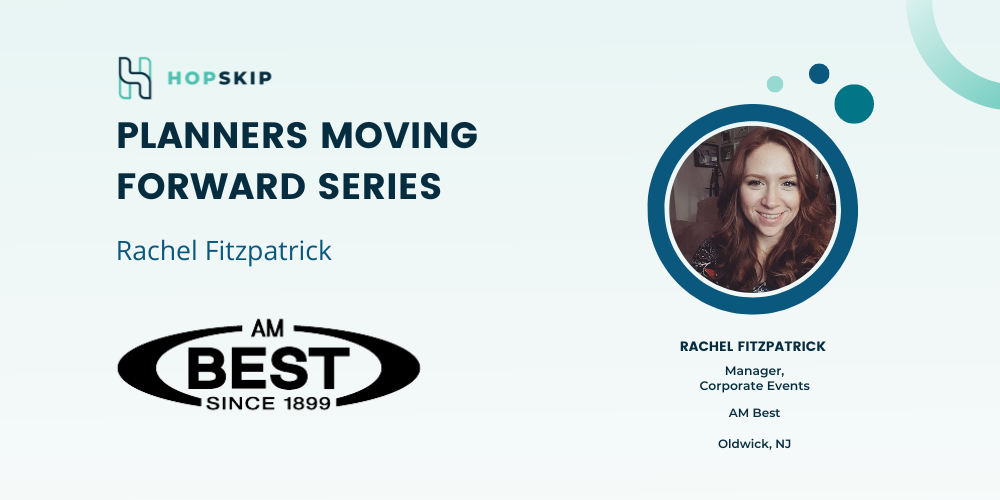This post is part of the HopSkip Planner Spotlight Series where HopSkip spotlight's planners across the industry to bring awareness of how they adapted to COVID-19, communicating and lessons learned and sharing how they are viewing the meetings and events industry in a post-pandemic world.
Name: Rachel Fitzpatrick
Company Name: AM Best
Job Title: Manager, Corporate Events
Years of Experience: 12
How do you think you are positioned, after months of persevering with the pandemic, to take advantage of our new and disrupted meetings/events landscape?
I feel both my organization and I are prepared for whatever the future meeting/event landscape may hold. Through the pandemic, I increased my education to prepare for planning virtual events by obtaining my certificate in Virtual Events and Meeting Management. The experiences over the past two years have provided the opportunity to learn new skills as well as build confidence in my ability adapt with the event industry. This past March, our annual conference was back in person, and the attendees were excited to be able to network in person which was something that was missed when the event was held virtually last year.
As our community moves forward with planning in-person meetings, what new technologies or processes are you implementing that you may have not looked at before?
For in-person events, cards with a QR code have been created to reduce touch points. The cards link to a landing page with the information to share with attendees(brochures, presentation slides, research reports). The health technology, CLEAR Health Pass, has been used as a COVID safety measure.
As we see virtual meetings transition back to face to face, hybrid meetings are beginning to be the vehicle to return to normalcy. What are your thoughts on hybrid meetings versus traditional fully in-person meetings?
My preference is to be fully in person as the networking and human interaction is irreplaceable. It provides the opportunity for small talk and building relationships. I do see the value of a hybrid event, as it can increase an audience and provides an option to attendees who may not be available or comfortable attending in person.
In your opinion, what do you think the biggest value for your attendees is in regards to returning to live events?
Networking, which I feel was something that was difficult to accomplish in virtual events. The connection found at a live event can be as important as the educational content.
As the pandemic fades away and we return to face-to-face events what do you hope changes, either for planners or hoteliers, in the traditional RFP and proposal process as a result of all of the learnings from the last 20+ months?
My hope is there will be flexibility and an understanding between planners and hoteliers as both have suffered losses in the past 20+ months. While hoteliers we have worked with have shown some flexibility, there is a need for venue's force majeure clauses to continue to evolve and offer more willingness to share the financial burden relating to cancelling or postponing events due to unforeseeable events.
This post is part of the HopSkip Planner Spotlight Series where HopSkip spotlight's planners across the industry to bring awareness of how they adapted to COVID-19, communicating and lessons learned and sharing how they are viewing the meetings and events industry in a post-pandemic world.
